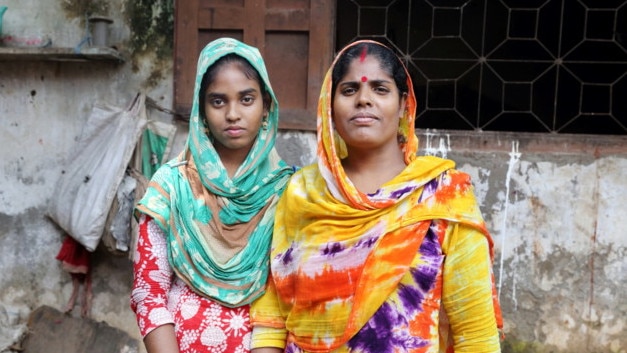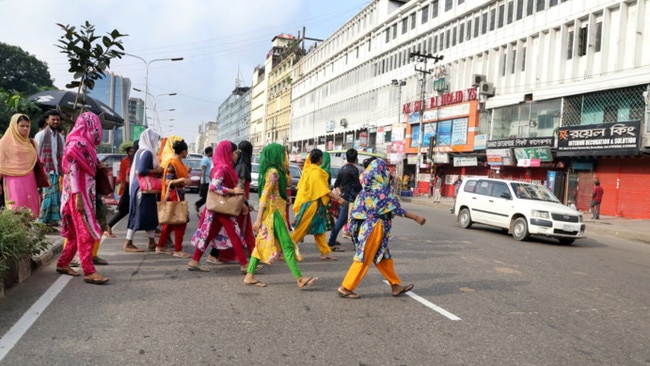New report shows workers employed by big Aussie brands are paid 50c an hour and starving
Garment workers of beloved Aussie brands are struggling to eat and stuck in cycles of debt as a new report shows wages as low as 50 cents an hour.
World
Don't miss out on the headlines from World. Followed categories will be added to My News.
A report released today shows the horrifically low wages paid to garment workers who sew clothes for beloved Aussie brands like Big W, Target, Cotton On and Kmart, saying all the workers are struggling to get by.
As retailers try to keep costs low while providing garments for fashion-loving Australians, garment workers in overseas nations are paid below local minimum wage and fear being fired.
The report shows many workers fear greatly for their job security and remain unable to progress in pay over periods of five years.
They often struggle to feed themselves, pay for medicine and many are stuck in a debt cycle of borrowing on loans they can’t repay.
The survey of workers and managers in garment factories for popular Australian brands found that in one country 100 per cent of workers were paid less than the local minimum wage, according to the investigation by Oxfam Australia.
After interviewing 470 different workers at factories that supply to Big W, Kmart, Target and Cotton On, the group found that 9 out of ten of the factory workers in Bangladesh did not have enough to make ends meet.
Results were similarly damning in Vietnam, where 7 out of ten respondents said their income did not meed their needs to survive.
As local retailers compete with one another to offer high quality jeans, T-shirts, underwear and bikinis for super low costs, the burden is felt by families overseas, who are employed for below poverty wages in factories and struggle to feed their families.
One worker, Sadia, 28, told Oxfam that the effect of living on poverty wages meant she not only couldn't save, but often found herself unable to buy food.
“I cannot save. I cannot even eat for living,” the Bangladeshi woman said.
“Our research shows that workers making clothes for Australian brands experience a perpetual debt burden,” the report read.
The report says the findings reveal a “systemic failure to ensure payment of wages that are enough for people to afford even the basics of a decent life”.
Australian brands would have to mark up price of a piece of clothing by about 1 per cent to absorb the cost of paying workers the local minimum wage, according to the report.
Australians can track the performance of beloved local brands at the What She Makes website.
Commitments have been made by Cotton On, Kmart, Target and City Chic to reach a living wage for garment workers, a move welcomed by Oxfam Australia.


In an interview with another worker, Chameli, who sews clothes for Big W, she told of being paid 50 cents an hour. Her average monthly wage was $128 and even when taking on overtime and working until 3 in the morning, she was unable to clear more than $165 a month.
Chameli recently allowed her daughter, 14, to leave school to enter the garment industry to work. The poverty wages endured by the Bangladeshi family mean they have entered into their own spiralling cycle of debt.
She has said she is motivated by the fear of her children starving. “I just think if I don’t work, my children won’t get any food, then I give the strength to myself,” Chameli said in the report.
“The investigation has uncovered the widespread payment of poverty wages and the impact this is having on the lives of the workers, mainly women, making the clothes Australians love to wear,” Oxfam Australia chief, Helen Szoke, said.
“Women who are unable to get treatment when they fall sick, workers who cannot afford to send their children to school, families that cannot make their pay stretch to put enough food on the table, people sleeping on floors in overcrowded houses, spiralling debts, mothers separated from their children – these are just some of the common realities of the failure of big brands to ensure the payment of living wages.”
“The first step is for iconic Australian brands to commit to a clear strategy and timeline that will help guarantee the payment of living wages to the workers making their clothes,” said Dr Helen Szoke, the Chief Executive of Oxfam Australia.
Originally published as New report shows workers employed by big Aussie brands are paid 50c an hour and starving


